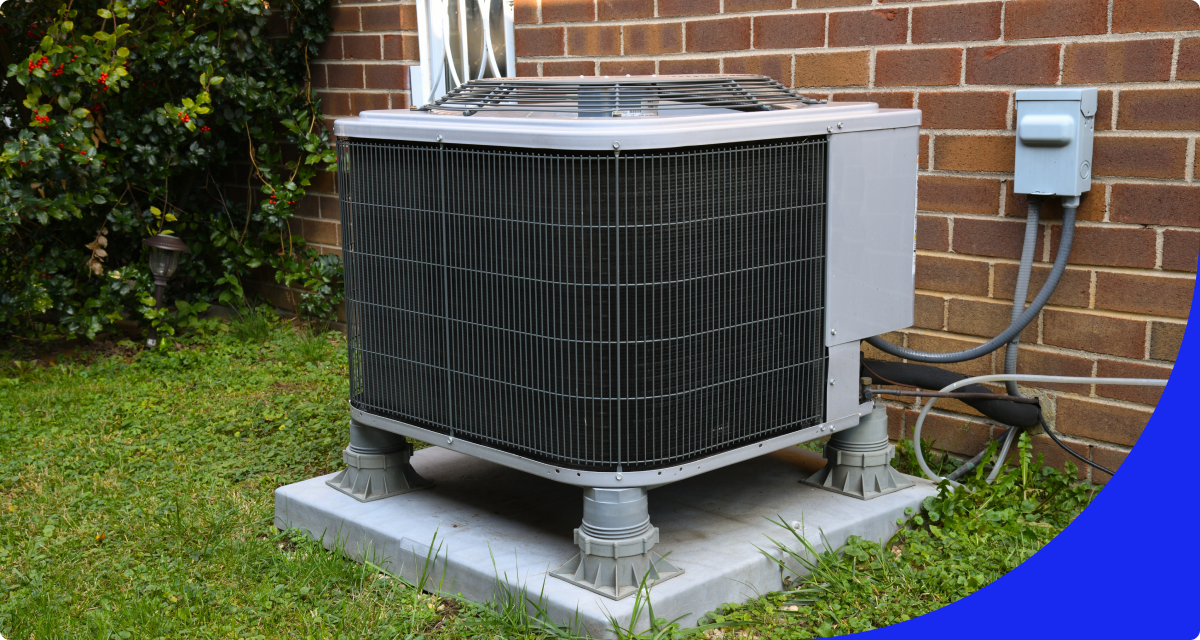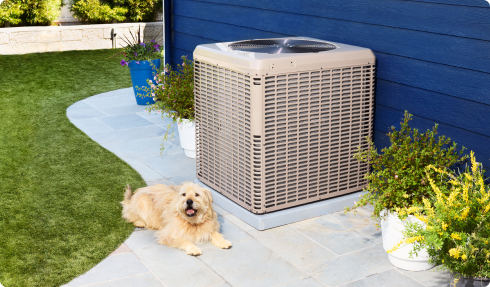Use the right professional repair Pro
Your new HVAC unit’s efficiency can be determined by its installation, so it’s imperative that you work with a quality pro. Interview several candidates and get detailed quotes from each.
Many homeowners rely on their HVAC system year-round, especially during the summer and winter months. The thought of your HVAC breaking down and having to replace it can be nerve-racking, especially during a hot or cold spell. If you have a unit that needs an HVAC tune up or to potentially be replaced, you’re in the right place.
We’ll dive into all the things you need to know about HVAC replacement, from how much a new HVAC system is, to how to determine whether replacement is necessary, to whether a home warranty will replace your AC unit.

If you’re considering replacement, you may be wondering how much a new HVAC system is. HVAC replacement costs can range up to $6,000* for an individual unit or up to $15,000 for a whole new system if you don't have a home warranty. HVAC service costs are one of the priciest when it comes to heating units or AC replacements, so you can expect about a third of the price of installing a new unit to go to labor. But if it looks like you need an entirely new HVAC unit, it’s safe to assume you’ll be spending thousands.
*Repair/Replacement costs ranges are the twentieth and eightieth percentile of U.S. costs as reported in A Study of Homeowners’ Appliance and Home Systems Service Experiences, a nationwide survey of homeowners conducted in 2024 by ClearVantage for American Home Shield. Further reproduction or use is expressly prohibited.
Knowing how much a new HVAC system is might make you to think twice before you make your final buying decision. When your HVAC is on its last leg, it’s important to consider how the details of your current system and lifestyle will factor into AC replacement cost. Before diving into this big decision, here are a few important things to think through:
From split systems and heat pumps to ductless mini-splits and packaged units, there are many types of HVAC systems. The one you choose should align with your home’s layout, your local climate, and your comfort needs.
Size matters, too. A system that’s too small won’t keep up on hot days, while one that’s too large could short-cycle—turning on and off more than it should—which wears out parts faster and wastes energy. A qualified independent repair Pro can perform a Manual J calculation (a fancy term for figuring out the right size based on your home’s specifics) to help you get it just right.
The fuel you use to heat and cool your home also affects your HVAC replacement cost and long-term energy bills. Common fuel types include:
HVAC replacement isn’t always a one-and-done job. Depending on the age and condition of your existing system, you might need to replace or update additional components like the ductwork, thermostat, the electrical/gas connections, or your home’s insulation.
These add-ons can affect your AC replacement cost or total HVAC replacement cost, so it’s smart to get a detailed estimate upfront.
A newer system is more efficient as well as more reliable. That means potential savings on your monthly utility bills and a smaller carbon footprint. For peak efficiency, look for a high SEER (Seasonal Energy Efficiency Ratio) or AFUE (Annual Fuel Utilization Efficiency) on the units you’re considering. And keep an eye out for ENERGY STAR® certified systems, which are recognized for meeting strict efficiency guidelines.
While higher-efficiency systems may come with a higher upfront price tag, they often pay for themselves over time in energy savings, and can even boost your home’s value.
It may be obvious that it’s time to replace your HVAC system. Your unit may have needed several repairs over the past couple of years. Or maybe it’s not so obvious:
Your energy bills may be costing more than they usually do this time of year, or you’re finding yourself constantly adjusting the thermostat. This can be especially frustrating when trying to stay cool during a heat wave or warm during the winter.
Even if you perform regular DIY HVAC inspections, it’s not always easy to know when exactly your HVAC system needs an upgrade. But there are some common signs that it’s time for an HVAC replacement, or at the very least, an HVAC tune-up:

ENERGY STAR recommends that homeowners replace HVAC systems every 10 to 15 years. That’s typically how long it takes for major HVAC components in modern systems to show wear to the point where it’s more cost-effective to replace them. And when you’re staring at that big HVAC replacement cost, remember that newer systems are more efficient, so at least your power bill should be lower.
Generally, HVAC filters should be replaced anywhere from every 30 days to every six months, depending on the type of filter. The frequency of your HVAC filter replacement also depends on the air quality where you live, if you have pets, and the size of your home. Use a website like Filter buy or discounted offers from FiltersFast (AHS members save 10% and free shipping on every order) to find the right HVAC filter for your system. Once you have your new filter, a trusted AHS Pro can help you install your new HVAC filter.
With so many HVAC options out there, deciding which unit to purchase can be overwhelming. Here are some important considerations:
Your new HVAC unit’s efficiency can be determined by its installation, so it’s imperative that you work with a quality pro. Interview several candidates and get detailed quotes from each.
The best way to get an accurate size estimate is to have your home professionally evaluated. Make sure your Pro performs a load calculation, which takes into account the size of your house, the climate, the roof material, the orientation of the unit, the number of units, and more. An HVAC installation Pro will consider factors like whether or not your home has a crawlspace or basement, how much insulation there is in the attic, how many floors it has, the number of people living there, what kind of doors and windows it has, how high the ceilings are, and what your desired indoor temperature is. Most homes will need a new HVAC unit sized around 20 BTUs per square foot.
The higher the Seasonal Energy Efficiency Ratio (SEER) rating, the more efficient the unit. Although a unit with a higher SEER rating may be more expensive, it could end up saving you more money in the long run.
Replacing your HVAC system isn’t a small expense. Luckily, there are smart ways to soften the blow. For starters, if your current unit is on its way out, you could qualify for federal tax credits just by choosing an energy-efficient system. Look for air conditioners and heating units labeled ENERGY STAR® Most Efficient, which meet the standards required for the tax credit.
Beyond federal tax incentives, many states and utility providers offer additional rebates that can help lower your HVAC replacement cost even further. It’s worth checking what’s available in your area—you might be able to get a portion of your installation costs back just for choosing a more efficient system.
Will a home warranty help replace your AC unit? The American Home Shield® New HVAC Program can help take the sting out of needing a new unit. If your covered system can’t be repaired, we can help with AC replacement costs, helping you stay in control of your home and your budget. Combine that with the protection our home warranty plans provide for your other appliances and systems—no matter their age—and it’s a solid step toward saving money today and protecting your peace of mind tomorrow.

Nothing says “investment” like a home system that you paid a pretty penny for. Whether you just replaced a tired old unit or upgraded to something high-efficiency, one thing’s for sure: you’ll want to keep it running at its best for as long as possible.
Even the most reliable systems can hit a snag now and then. That’s why regular maintenance is key—and why having a plan in place to protect your budget from surprise repair costs can give you serious peace of mind.
Here are a few simple ways to take care of your new system:
Of course, even with great care, breakdowns can still happen. For covered breakdowns, that’s where we come in.
An American Home Shield® home warranty plan protects your budget when your HVAC gives you trouble from normal wear and tear. Unlike some plans, we cover systems and appliances no matter their age. That means your new HVAC unit is covered from the start—and if it can’t be repaired, we offer our American Home Shield HVAC replacement program, subject to plan agreement limitations and exclusions.
Every home warranty plan we offer includes air conditioning coverage and home heating coverage, so you can stay cool (or cozy) knowing you’ve got reliable backup when it matters most.
AHS assumes no responsibility, and specifically disclaims all liability, for your use of any and all information contained herein.